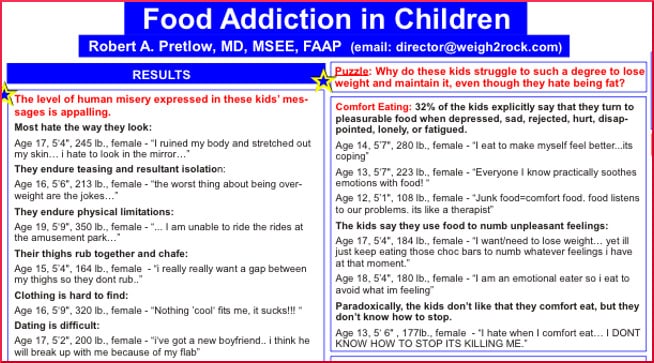Available both online and in the print edition of the journal Childhood Obesity is Dr. Pretlow’s paper, “Treatment of Child/Adolescent Obesity Using the Addiction Model: A Smartphone App Pilot Study.” As Dr. Pretlow says:
This publication signals another advance in spreading the idea of using the addiction approach as a treatment for child/adolescent obesity.
Among the ideas discussed is the concept of addiction guilt, which can create another of the pesky “vicious circles” that plague the struggle against obesity.
One topic very much on Dr. Pretlow’s mind is that of motivation. What does it take to get kids not only motivated, but inspired? Because fear, shame, and other negative emotional states don’t do it.
It used to be that adults could sigh and say, “The kids simply don’t understand the consequences that today’s obesity sets them up for, further on down the road.” But in recent history, more and more obese children and teens are facing present-day, real-time consequences in the form of disease processes that show up shockingly early in their lifespans.
Remember Davion in the film Bite Size? This poor kid had to take blood out of his finger and shoot himself up with insulin every day. If that isn’t a motivation to lose weight, what is? Well, in his case, the desire to play football was the big kick in the pants that got him fired up.
In the same film, we learn about how KeAnna copes with life. She was only two years old when her mother died, and motivates herself toward health by imagining it’s what her mom would want for her. For this vivacious yet sensitive young woman, honoring a departed loved one connects her with the necessity and possibility of honoring her own life. Her story is a perfect illustration of how the individuality of humans is a major barrier to the discovery of “one size fits all” answers. As Dr. Pretlow says:
Further research is required to determine the best methods for inspiring youth to engage in food withdrawal process.
Finding Motivation To Lose Weight
The behavioral addiction to overeating can be overcome by retraining the brain through the process of withdrawing from excessive food amounts. With the help of W8Loss2Go, the addiction-based obesity intervention program delivered through youth-popular smart phone technology, mealtime amounts are reduced by small increments. This part of the program takes place over 12 weeks.
At the end of the study, kids reported they were better able to gauge the correct amounts of food, and were less likely to use food as an emotional bandage for stress. They also reported increased self-esteem. The staged, incremental food withdrawal approach works and can be widely available to young people who are not able to spend time in residential treatment facilities, which is the vast majority of them.
The pilot studies also revealed that younger participants and males achieve better weight loss than older kids and girls. Success is even better predicted by one other factor: doing the work. Not surprisingly, when mentors rated how the kids did, high program compliance correlated impressively with weight loss.
Your responses and feedback are welcome!
Image by Dr. Pretlow


 FAQs and Media Requests:
FAQs and Media Requests: 











